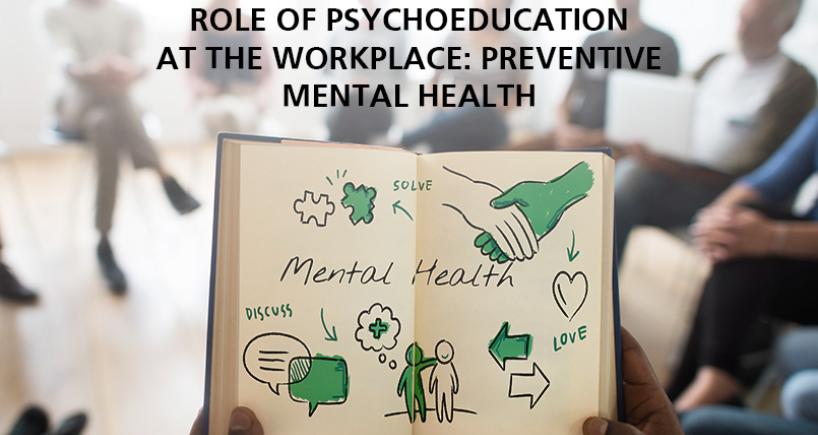
Role of Psychoeducation At The Workplace: Preventive Mental Health
One of the greatest hurdles that organisations and employees face once they have realised the importance of mental health at the workplace is how to promote well-being and address mental health related concerns employees may have. This is where the role of psychoeducation comes in. Psychoeducation is to educate and equip employers or leaders with the knowledge of mental health and at the same time promote the benefits of peak mental health and its impact on performance. Psychoeducation is the first step to initiate action around well-being. Psychoeducation can provide every employee and leader with the knowledge to be aware about those around, and better equipped to provide support and encouragement to those seeking help for their mental health. Since there immense stigma and apprehension around mental health, psychoeducation aims to address through education these aspects for everyone in the organization.
BENEFITS OF PSYCHOEDUCATION AT THE WORKPLACE
- Psychoeducation helps provide a vocabulary to people to communicate what they are experiencing emotionally and mentally in an effective manner.
- Increased communication increases the possibility of employees receiving access to resources and treatment in a timely manner and enhanced support at the workplace.
- Providing psychoeducation in the workplace normalizes the conversation regarding mental and emotional well-being and thereby reduces stigma around mental health concerns.
- Most importantly, psychoeducation empowers every individual in the organization with the ability to identify their own mental health needs.
ROLE OF ORGANISATIONS AND EMPLOYERS
- Senior management and other supervisors play an important role in psychoeducating the employees about mental health issues and creating an environment where awareness of mental health issues is encouraged. This can be done through workshops and encouraging open discussions about topics relating to mental health and well-being. Leading by sharing can be helpful in this regard.
- Assess psychological safety at workplace which involves a set of beliefs that employees have about how their problems will be seen and responded to and errors or mistake they make will be addressed.
- Provide education and training that ensures managers and employees know how to recognize hazards such as harassment, bullying and psychologically unhealthy workplace behaviours and practices. This training would provide concrete ways for co-workers to recognize and talk about health issues in general. Managers can additionally contribute to a positive work environment if they have the skills and knowledge to identify and respond to issues before they escalate.
- Develop a policy statement that reflects the organisation’s commitment for making workplace mental health a priority. Additionally the health and safety policy should address the commitment to addressing psychosocial risk factors as well.
- In case an employee shares about having a mental health related problem the employers must respond in a cooperative and accommodating way. Finding ways to make adjustments that will support employees in doing their jobs is crucial. At the same time access to resources may need to be provided.
- It is important to invest in effective management skills and to receive regular trainings on aspects like stress management skills, leadership styles, having difficult conversations and managing conflict.
CONCLUSION
Psychoeducation can be a step forward in making workplace well-being a reality. Starting from the employers and leadership teams there needs to be a flow of information and understanding about mental health and well-being and a push for practices that promote these within the organization. Investing in trainings, programs and making effective, implementable policies can all help in achieving these goals. To know more about the Fortis Workplace Mental Health Initiative write to us at [email protected] or call on +918588807193. Follow on Telegram at https://t.me/fortismentalhealth for more on Workplace Mental Health.










